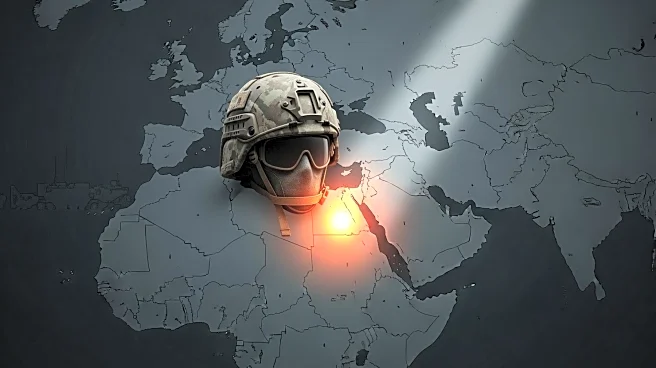What's Happening?
Iraq's Prime Minister Mohammed Shia al-Sudani announced that a small contingent of U.S. military advisers will remain in Iraq to coordinate with U.S. forces in Syria against the Islamic State group. This
decision follows an agreement between Washington and Baghdad to reduce U.S. military presence in Iraq by September. However, developments in Syria have necessitated the retention of 250 to 350 advisers at the Ain al-Asad air base in western Iraq. These advisers will support counter-IS surveillance and coordination with the al-Tanf base in Syria. Despite the reduced threat from IS within Iraq, the country is balancing its relations with the U.S. and Iran, avoiding regional conflicts.
Why It's Important?
The continued presence of U.S. military advisers in Iraq highlights ongoing security concerns related to the Islamic State group in the region. This decision impacts U.S.-Iraq relations and reflects Iraq's strategic approach to regional stability. The move also underscores the complexities of Iraq's foreign policy, as it navigates its relationship with both the U.S. and Iran. The presence of Iran-backed militias in Iraq and the potential resurgence of IS pose challenges to Iraq's internal security and political landscape. The situation could influence Iraq's upcoming parliamentary elections and its future political direction.
What's Next?
Iraq is preparing for parliamentary elections next month, which will determine whether Prime Minister al-Sudani will serve a second term. The elections could impact Iraq's approach to foreign policy and its relationship with the U.S. and Iran. Additionally, the Iraqi parliament is considering legislation to formalize the relationship between the military and the Popular Mobilization Forces, which could affect U.S.-Iraq relations. The outcome of these elections and legislative decisions will shape Iraq's security strategy and its role in regional geopolitics.
Beyond the Headlines
The retention of U.S. military advisers in Iraq raises questions about the long-term implications for Iraq's sovereignty and its ability to manage internal security threats independently. The presence of foreign military forces can influence Iraq's political dynamics and its interactions with neighboring countries. Furthermore, the integration of armed factions into political entities could alter Iraq's political landscape, potentially leading to shifts in power and governance.









